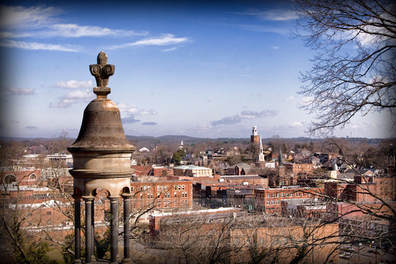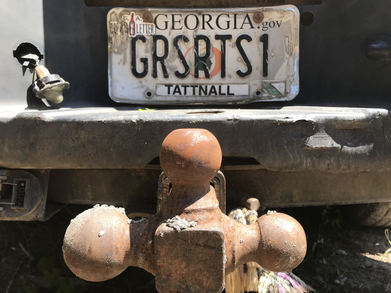|
Sam Burnham, Curator @C_SamBurnham  Free Trade Is About Main Street, Not Wall Street Free Trade Is About Main Street, Not Wall Street There is a lot of talk about trade and tariffs and trade deficits and trade partners and all sorts of other details pertaining to the importing and exporting of goods.I'm not an economist. I don't have an economist of staff. I don't even really know any economists off the top of my head that I could call to advise me on this article. But I know just enough to say the few things that I meed to say here. In the 1840s and 50s, there were scuffles about tariffs and trade. The Southern economy was based in agriculture. Any manufactures good either came from the North or Europe. The cotton crop was only profitable because cotton bales could be put on ships and sent to Liverpool, or less often places in the North like Lowell, Massachusetts to be processed. British companies could often offer better prices for cotton and, in turn, the manufactured goods that Southerners needed or wanted. Tariffs put the North on equal footing with manufactured goods but also harmed the cotton prices. So while the argument could be made that the US as a whole benefited from the tariffs, the South was not benefiting at all. We are bound to find ourselves in a similar situation. Our economy is still largely agricultural and still benefits largely from exports. The United States is the tops source for pork in China. That is before you factor in poultry, grains, fruits and vegetables. And yes, we are still exporting cotton. If our trade partners counter tariffs with some of their own, our prices will suffer. While tariff might put US businesses on a level playing field price-wise, they do nothing to lower market prices on the whole. They merely raise the imported product price closer to the level of a domestic one. That being the case, concerned citizens can do the same thing without the tariffs by just purchasing products that are made in the US. Supply and demand will work out the rest. Granted many of the products being imported and exported are resources or materials that will be used in domestic manufacturing - such as steel to be used in appliances, automobiles, construction, etc. But a little consumer research can guide a concerned customer to the most domestic products. This is simply the responsibility of a responsible and conscientious consumer looking out for the economic well being of our society. Taking that to the next level would be to make the home location of a product a consideration when purchasing. Price will always be a consideration. But if you can begin your location priorities with your local area and then spread out from there, you'll be helping your economy as a responsible consumer. For instance, if I prioritize products from my hometown, then my part of Georgia, then Georgia as a whole, then the Georgia-Florida-Alabama-South Carolina region, spread out through the South before spreading out from there, I am using a method of free trade that will strengthen my town as well as our neighbors. I'm saving on shipping time, costs, pollution, middlemen, etc. I'm creating more jobs, most likely with more numerous small enterprises. It isn't applicable to every product you buy but it can be a start that could lead to an increase in available local products as the economy improves. I'm decentralizing the market and creating more options closer to home. Free trade is not a bad thing on any level. What we do with free trade can be beneficial or destructive. The only healthy way to treat free trade is to realize that it isn't controlled by Washington or Beijing any more than it is by our personal checkbooks and acting accordingly. Free trade doesn't just happen at the port of entry. It happens at the cash register.
0 Comments
This shouldn't take very long.
The video and images coming out of Newnan this morning are stupid. I didn't follow it on the news yesterday. I didn't want to give any undue attention to stupidity. The planned visitation of non-local Nazis as well as the counter-protests (also likely with a large non-local participation), aggravated by the fiasco in Charlottesville caused a predictable overreaction by law enforcement. The Nazis should have stayed at home, the counter-protesters should have ignored the Nazis, and the police shouldn't have ridden around in tanks. In short, I'm tired of this asinine stuff taking over quiet Southern towns. Sam Burnham, Curator @C_SamBurnham Earlier this year I discussed the significance of people and their intrinsic worth - the economy of people. In the Agrarian mindset, there is another economy to discuss. Like people, it is vital to the our monetary economy and is usually discussed in terms of its monetary value or worth - it's market price. But, like the economy of people, the economy of place can produce a very different value to different people based on different factors.  Birdmane is Forever Tied to Tattnall (Photo courtesy Grassroots Farms) Birdmane is Forever Tied to Tattnall (Photo courtesy Grassroots Farms) If you are looking for real estate and you are factoring only values, prices, and potential for resale, etc on monetary purposes alone, you might be looking at Midtown Atlanta, maybe Sea Island, perhaps on one of the squares in Savannah. They are popular, they're convenient to amenities, they are valuable, desirable. But those factors have no impact on the true value of the land. The true value of it can only be estimated by those who have a connection, a bond with the land. I'm not speaking of a personification of a place. It's much bigger than that. The value of the land is based in a culmination of people, of stories, of memories. The relationship between land and a person takes on an intimacy of sorts - the land becomes part of the person and the person, in turn, becomes a part of the land. It is this exact bond that leads me to confuse, even anger people to tell them I am a Georgian and a Southerner before I am an American. Some would call it small -minded but Georgia is a place, and regions of Georgia even more so. America is more of an idea. As a place it is much too large and diverse to sever as a true identity. It lacks the intimate connection that my friend Brandon expressed about Tattnall County in a recent Instagram post at Classic Georgia. With that love of the land comes the only true hope of protecting it. Because it is this love that can produce the true concern for the land that can inspire a level of protection that no state or federal code could ever hope to achieve. The woods where a man's grandfather taught him to hunt are safer from clear cutting than the land protected by the codes of crooked politicians who've never laid eyes on the land. The politicians see the land value in votes, the timber industry in dollars, and the person with that attachment sees the value as one exceeding money. Once the attachment value of a place exceeds the market value, that place is safe from unhealthy practices. That landowner will defend it at all costs and will only allow resources to be used in ways they believe to be healthy - which does not include sitting idle to never be used. It means wise usage and management. If the value of the land is reduced to monetary alone, the resources can be dismantled in the cheapest, most profitable way. In those cases places are threatened. In the economy of place, values are subject to change with the generations and the thinking of the people involved. But so long as a place is loved, it will always be valuable, regardless of what the market says. This will work for wild lands, farmland, even a blighted neighborhood. If homeowners have that love of place, they will work to improve their place. As long as these neighborhoods are controlled by slumlords and government housing, the value can only be measured in profits and votes. This ties back into the community stories and even the banking story that I've done here. The economy of people, the economy of place, the economy of community, these things all connect. If they are all collaborating well, the world will work right. Right now, things aren't connecting as they should be. Our nation is struggling. It will continue to struggle until we can reconnect the these economies, get them in their proper place, and start carrying this nation back where it should be. Love your place. If you don't, get up and move to a place you love and stay there. Then treat that place like you love it. |
Sam B.Historian, self-proclaimed gentleman, agrarian-at-heart, & curator extraordinaire Social MediaCategories
All
Archives
November 2022
|




 RSS Feed
RSS Feed
